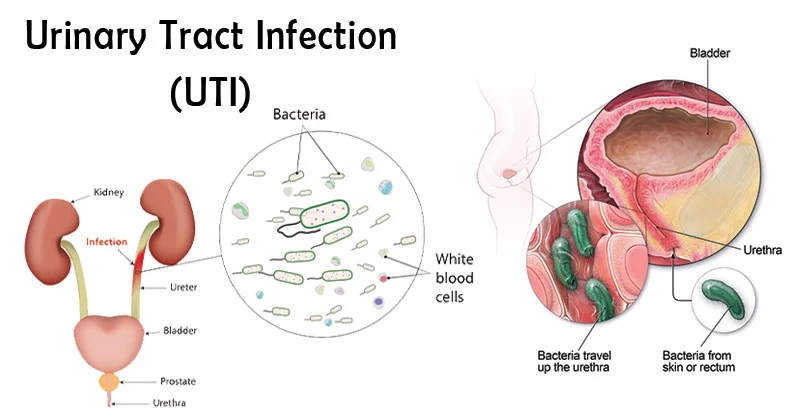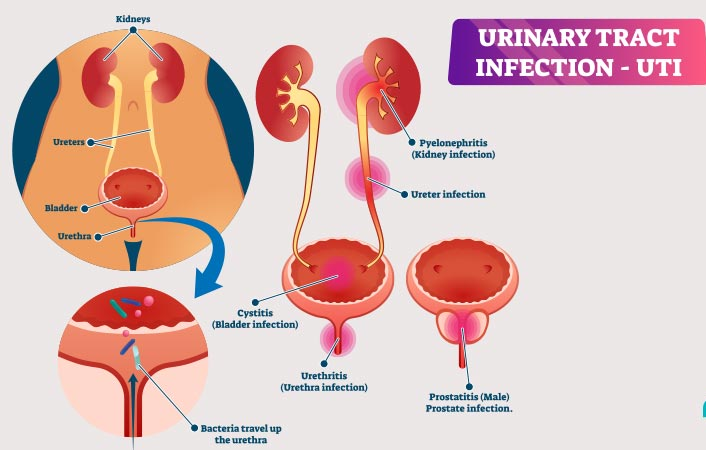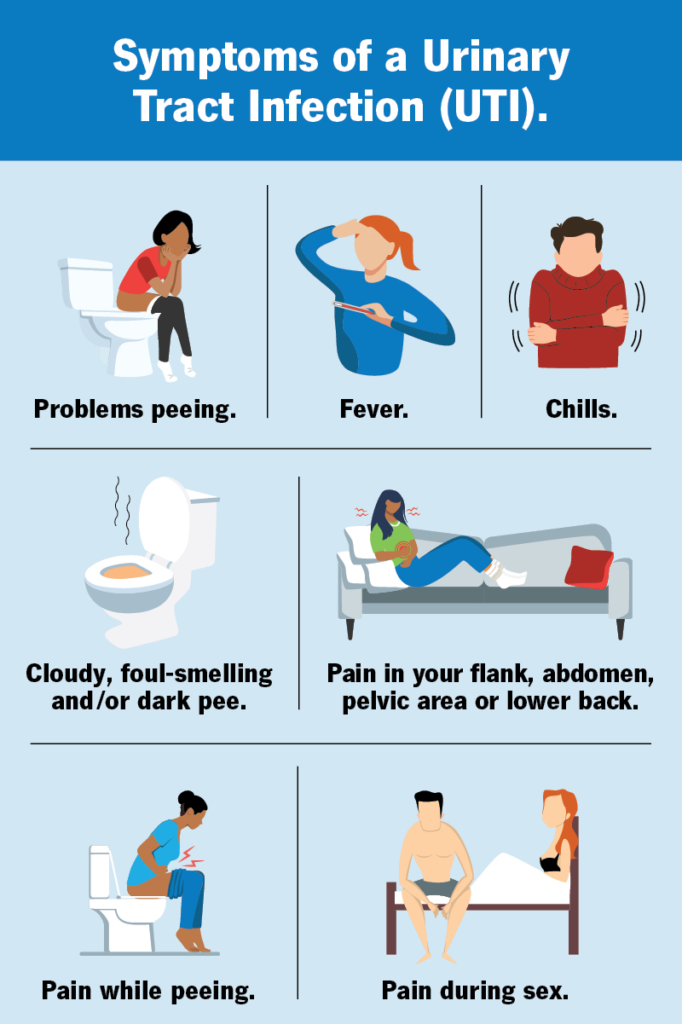Urinary tract infection (UTI) is an infection occurring in any part of the urinary tract system. This article will cover the homeopathic treatment for UTI, their causes, symptoms, types, risk factors, management of UTI and best homeopathic medicines.
The urinary tract system is divided into two parts the upper urinary tract and the lower urinary tract.
A pair of kidneys and a pair of the ureter constitutes the upper urinary tract. The lower urinary tract consists of the bladder and the urethra.
The urethra lies close to the anus i.e., the outlet for stool in the body.
The urethra is a tube-like structure that is hollow and it extends from the bladder to the outside of the body.
It is the passage through which urine is passed from the bladder to the outside through the urethral opening.
As the distance between the urethral opening and the anus is very close, there are high chances that the microbes and germs from the intestine can travel from the anus to the urethra.
These germs and microbes when reaching the kidneys can cause infection in the kidneys and along the urinary tract pathway which is known as urinary tract infection.
Infections occurring at different regions in the urinary tract are known by different names, for example, urethritis (infection in the urethra), cystitis (infection in the bladder), Pyelonephritis (Infection of the kidneys). Ureteric involvement is uncommon.
A few microorganisms such as E. coli (Escherichia coli), Chlamydia and Mycoplasma are among the very common causes of urinary tract infection. Chlamydia and Mycoplasma mostly cause infection in the ureter but not in the bladder.

Table of Contents
ToggleUTI Types
There are three types of urinary tract infection depending upon the part involved.
A. Urethritis
The infection occurring in the urethra is known as urethritis. The function of the urethra is to carry urine from the bladder to the outside of the body.
B. Cystitis
The infection in the urinary bladder is known as cystitis. The bacterias move upwards to the bladder through the urethra.
C. Pyelonephritis
The infection in the kidneys is known as pyelonephritis. The infection reaches the kidneys through the bladder and the ureters.

UTI Causes
The microorganisms and bacteria that enter the urinary tract system are the major causes of urinary tract infection.
Bacteria:
Some bacteria are present in the intestine and contribute to the proper functioning of the intestine.
They are present in the stool. When these bacteria enter the urinary tract through the urethra, they cause infection in the urinary organs.
Examples of such bacterias are E.coli (Escherichia coli), Chlamydia and Mycoplasma.
Infection from other organs:
In some cases, infections from the other parts of the body through blood may reach the urinary tract system and cause infection.
Catheterization:
A catheter is a small hollow tube-like instrument that is used to drain urine in bedridden patients. It can also put the patient at risk for a urinary tract infection.
Sexual intercourse:
People who have multiple sex partners or new partners are prone to get urinary tract infections.
UTI Symptoms
Pain and burning in the urine:
It is one of the earliest symptoms of urinary tract infection. There is a burning sensation while peeing which is followed by pain.
It makes the patient very uncomfortable.
Increased frequency of urination:
This is a characteristic symptom. The urge to urinate is highly increased. The patient may feel the urge to pass urine at very short intervals e.g., 5-6 minutes.
Incomplete voiding of the bladder:
The patient may feel that the bladder is not emptied. There is a sense of incomplete voiding of the urine. This makes the patient very irritable.
Lower abdominal pain:
The patient may feel pain in the lower part of the abdomen, sides, back and waist.
Blood or pus in the urine:
There can be the presence of a little amount of blood or pus in the urine in untreated cases.
Fever:
Fever is mostly experienced by patients who have been catheterised at hospitals.
Yellow and offensive urine:
An offensive, pungent smell comes from the urine.
Painful coition:
Sexual intercourse becomes painful. The patient experiences pain for hours after coition.
Nausea, vomiting and body pains:
Due to the infection, the patient may feel nausea, vomiting and occasional body aches.

Risk Factors for UTI
Female gender:
The urinary tract infection is more common in females. This is because women have a shorter urethra than males.
The chances of bacterias travelling from the anus to the urethra in females are high. Fifty per cent of women suffer from urinary tract infections at some point in life.
About thirty per cent of women have recurrent urinary tract infections.
Antibiotic heavy doses:
The good bacteria in the bladder and kidney get harmed due to the heavy doses of antibiotics. This increases the risk of getting a urinary tract infection.
Contraceptive devices:
Spermicide condoms, cervical caps and some other contraceptive devices can increase the risk of getting a urinary tract infection.
Pregnancy:
Pregnant women are at greater risk of urinary tract infection due to changes in the body and hormones.
Getting a urinary tract infection during pregnancy can be harmful to both the mother and the child.
Kidney stones:
People suffering from kidney stones are also at risk because the kidneys are already infected and inflamed.
Diabetes:
Diabetes damages the small vessels in the urinary tract system that make the patient prone to infections.
Diabetes also weakens the immune system making the body weak to fight against infections.
BPH (Benign prostatic hyperplasia):
In benign prostatic hyperplasia, the urine flow is hindered and the patient feels that the bladder is not fully emptied.
It also increases the risk of getting affected by urinary tract infections.
Bad personal hygiene:
Bad personal habits and hygiene put the patient at a higher risk of getting infected by a urinary tract infection.
Harsh chemical cleansers:
Using harsh chemicals that contain irritating chemicals affect the barrier protection of the skin of the genital organs.
UTI Diagnosis
The doctor will decide the investigations based on the sign and symptoms.
Urine sample analysis:
a sample of urine is taken for laboratory tests to identify bacteria and microbes that are present in the urine.
It will in determining proper treatment. The urine sample should be a “clean-catch” sample i.e., it should be collected from midstream urine.
Urinary tract imaging:
Imaging of the urinary tract helps in identifying any structural change in the urinary organs.
When there is achronic or recurrent infection then the doctor may advise USG, CT or MRI.
A long thin tube is inserted into the bladder through the urethra. It will detect the abnormalities and help in seeing inside the urinary organs more precisely.
UTI Management
A few important lifestyle management tips can be followed for fast recovery and reducing suffering.
Increase water intake:
Drinking more water will dilute the urine and helps in flushing out the bacteria and other causative organisms from the urinary tract.
It will also relieve the burning sensation while passing urine. 3-4 litres of water is necessary for UTI (urinary tract infection).
Avoid spices:
Spicy food and junk increase the intensity of symptoms such as burning sensation while peeing and frequent urge to urinate.
Maintain proper hygiene:
Keep the undergarments clean and dry them in sun. Pay special attention to the cleanliness of genital organs. Always try to keep the genital area clean and dry.
Use heating pads:
Using heating pads will relieve the pain and discomfort in the lower abdomen.
Cranberry juice:
It will improve immunity and lower the chances of infection.
Treat the underlying cause. Sometimes, the cause of infection is deeper, for example, kidney stones.
Homeopathic Treatment for UTI – Best Medicines
Homeopathy is a natural healing system that is completely capable of relieving a wide range of medical issues including urinary tract infections.
It annihilates the disease from the root cause. Let’s take a look at major homeopathic remedies indicated for urinary tract infections.
1. CANTHARIS: For frequent desire to urinate
Symptoms:
Cantharis is the topmost remedy used for treating urinary tract infections.
The patient complaints of an intolerable constant urge to urinate at very short intervals.
The urine is hot and there is a burning sensation while passing the urine. It can be followed by pain and itching.
The patient may notice blood in the urine. There is a characteristic symptom of cantharis that the urine flows drop by drop.
It produces burning and pain in the urethra. The patient becomes restless. Sexual intercourse worsens the symptoms.
Potency and dosage:
Cantharis 1M can be taken as four pills or drops once a week till improvement occurs. Cantharis 200CH can be taken as four pills or drops once daily till improvement occurs.
Cantharis in 30CH can be taken as four pills or drops twice daily till improvement occurs.
2. APIS MELLIFICA: For intolerable burning pains
Symptoms:
Apis is a very popular homeopathic remedy used for the treatment of urinary tract infections when the symptoms match.
The patient complains of severe burning pains and soreness while passing urine. The amount of urine becomes scanty.
The urine may pass involuntarily as the urge to urinate is very frequent. The last few drops burn violently.
There is a characteristic stinging pain while urinating.
Potency and dosage:
Apis mellifica 1M can be taken as four pills or drops once a week till improvement occurs.
Apis mellifica 200CH can be taken as four pills or drops once daily till improvement occurs.
Apis mellifica in 30CH can be taken as four pills or drops twice daily till improvement occurs.
3. EQUISETUM: For the non-relieving frequent urge to urinate
Symptoms:
Equisetum is a popular homeopathic healing agent for urinary tract issues. The patient complains of a feeling of fullness in the bladder.
There is a constant urge to urinate. The patient is not relieved after passing the urine.
There is a characteristic symptom of equisetum that there is a violent pain at the closure of urination.
The drop by drop passing of urine makes the daily activities difficult. The patient complains of a cutting pain in the urethra.
Equisetum is the remedy of choice for treating urinary tract infections in pregnant women and children.
Potency and dosage:
Equisetum 1M can be taken as four pills or drops once a week till improvement occurs. Equisetum 200CH can be taken as four pills or drops once daily till improvement occurs.
Equisetum in 30CH can be taken as four pills or drops twice daily till improvement occurs.
It can also be taken in mother tincture form i.e., Q potency, 10 drops in half cup of water twice daily.
4. KREOSOTE: For urinary tract infection with itching
Symptoms:
Kreosote is a helpful remedy for urinary tract infections which are accompanied by itching in the urethra and other genital organs.
The urine is offensive. The patient is always in a hurry to urinate. The urine flow drop by drop.
The itching and burning sensation remain constant in the genital area.
Potency and dosage:
Kreosote 1M can be taken as four pills or drops once a week till improvement occurs. Kreosote 200CH can be taken as four pills or drops once daily till improvement occurs.
Kreosote in 30CH can be taken as four pills or drops twice daily till improvement occurs.
5. STAPHYSAGRIA: For urinary tract infection due to sexual intercourse
Symptoms:
The urinary tract infection caused by sexual intercourse can be very efficiently treated by this remedy.
It is helpful for newly married people with increased urinary frequency. The urine flow drop by drop.
There is a sensation of fullness in the bladder. Burning sensation remains constant even while not urinating.
Urging and pain increase after passing urine. Staphysagria is helpful for elderly patients who suffer from prostate issues.
It is also used to treat discomfort and urinary infections after kidney stone surgery.
Potency and dosage:
Staphysagria 1M can be taken as four pills or drops once a week till improvement occurs. Staphysagria 200CH can be taken as four pills or drops once daily till improvement occurs.
Staphysagria in 30CH can be taken as four pills or drops twice daily till improvement occurs.
6. SEPIA: For long-standing urinary tract infection
Symptoms:
Sepia is the best choice of remedy when the urinary tract infection becomes chronic. It is also helpful for treating blood in the urine.
The patient complains of pain and discomfort in the lower abdominal region and waist. The urinary bladder is mainly affected.
The symptoms of pain in the lower abdomen are relieved by using heating pads. The patient complains of a constant desire to urinate.
There is a burning sensation each time while passing urine.
Potency and dosage:
Sepia 1M can be taken as four pills or drops once a week till improvement occurs. Sepia 200CH can be taken as four pills or drops once daily till improvement occurs.
Sepia in 30CH can be taken as four pills or drops twice daily till improvement occurs.
7. SARSAPARILLA: For urinary tract infection with pain at the closure of urination
Symptoms:
Sarsaparilla is a very popular homeopathic healing agent suitable for cases where there is a characteristic symptom of violent pain at the closure of urination.
The urinary stream is weak. the urine may flow drop by drop. There is a pain in the lower abdominal region.
It is indicated for patients who have renal stones or kidney stones. There is a feeling of fullness in the bladder as if the bladder is not completely voided.
The patient complains of pain and difficulty while passing urine.
Potency and dosage:
Sarsaparilla 1M can be taken as four pills or drops once a week till improvement occurs. Sarsaparilla 200CH can be taken as four pills or drops once daily till improvement occurs.
Sarsaparilla in 30CH can be taken as four pills or drops twice daily till improvement occurs.
8. PULSATILLA: For frequent urge to urinate with burning pains
Symptoms:
Pulsatilla is helpful in the urinary tract infection which is accompanied by spasmodic pains in the lower abdomen.
The pain remains constant before and after urination. Sometimes, the urine is passed involuntarily.
Sensitive, mild and delicate ladies who suffer from urinary tract infections can be benefited from this remedy. Citrus juices and cold beverages worsen the symptoms.
Potency and dosage:
Pulsatilla 1M can be taken as four pills or drops once a week till improvement occurs. Pulsatilla 200CH can be taken as four pills or drops once daily till improvement occurs.
Pulsatilla in 30CH can be taken as four pills or drops twice daily till improvement occurs.
9. ACONITE: For acute painful urination and burning
Symptoms:
Aconite is a very good remedy to treat acute urinary tract infections occurring at any age. The urine quantity becomes scanty. There is pain and discomfort in the lower abdomen.
The suffering makes the patient physically and mentally restless. The patient is anxious before urination. There is a burning sensation in the urethra.
Occasionally blood can be present in the urine. It is also helpful for people suffering from prostatic issues.
Potency and dosage:
Pulsatilla 1M can be taken as four pills or drops once a week till improvement occurs. Pulsatilla 200CH can be taken as four pills or drops once daily till improvement occurs.
Pulsatilla in 30CH can be taken as four pills or drops twice daily till improvement occurs.
10. MERCURIUS: For pain at the beginning of urination
Symptoms:
Mercurius is a very well known remedy in homeopathy used for the treatment of various conditions including urinary tract infections.
The patient complains of slightly greenish discharge from the urethra. The urge to urinate is constant and strong.
It makes the patient very irritable. There is pain at the beginning of urination. The urine is dark and offensive.
The urine is scanty. The patient may notice blood in the urine. The urine appears red.
Potency and dosage:
Mercurius 1M can be taken as four pills or drops once a week till improvement occurs. Mercurius 200CH can be taken as four pills or drops once daily till improvement occurs.
Mercurius in 30CH can be taken as four pills or drops twice daily till improvement occurs.
Remember that homeopathic remedies are prescribed based on individual symptoms and characteristics. It’s crucial to consult with a qualified homeopath for proper evaluation and personalized treatment. Homeopathy focuses on treating the whole person, so a detailed case study is necessary to select the most appropriate remedy.
Homeopathic medicines should be taken only when prescribed by a homeopathic physician. Self-medication may aggravate the original conditions.

7 thoughts on “Homeopathic Treatment for UTI – Causes & Best 10 Medicines”
What about the bacterial infestations in the urinary tract and bladder?
Given medicines can be used according to the symptom similarity.
Would the dosage be the same for a toddler?
no for toddler dosages will be 1/4
Would the dosage be the same for a toddler?
dosage would be 1/4
Do any of these remedies kill the bacteria that caused the infection, or do they just relieve the symptoms?